- Home
- Steven Ehrman
The Iron Dog (A Sherlock Holmes Uncovered Tale) Page 5
The Iron Dog (A Sherlock Holmes Uncovered Tale) Read online
Page 5
“What is the agenda for the day, Holmes?” I asked.
“I have several telegrams out that I expect answer to, and from them we can accordingly set our plans. I believe all will be done with by the end of this day.”
“So soon, Holmes?” I cried. “You are a magician.”
“Nothing of the sort, doctor, I merely follow the facts where they lead me, and do not attempt to twist the facts to fit any particular theory. This case has taken several unexpected courses, but all is now in order.”
“From whom are you now awaiting responses?”
“There are several parties, but the first one, I believe, has chosen to answer in person. I perceive that is the step of Lestrade.”
No sooner had these words escaped the mouth of Holmes, than Lestrade was admitted by our page. He looked to be in a surly mood, and curtly nodded to each of us.
“Holmes, what is the meaning of this?” he asked, shaking a telegram in his hands. “Do you seriously ask me to bring a prisoner from gaol to a meeting at the scene of the very crime of which she stands accused? My word, Holmes, I am blessed if I haven’t given you your head before, but this is the absolute limit.”
“It is merely a request, Lestrade,” said Holmes soothingly. “Should you choose to deny it, you would certainly be within your rights, but I believe it is in your self-interest to grant me this request. Mrs. Rutherford had already consented to host the doctor and myself.”
“Does she know that the Crawley woman will be there?” asked Lestrade suspiciously.
“I do not believe that it came up,” said Holmes blandly.
“I can believe that, Holmes.”
“It may be somewhat of a surprise, but once it is presented as a fait accompli I am certain she will acquiesce.”
Lestrade was silent for a moment as he considered Holmes’s words. It was indeed an audacious request by my old friend, but Lestrade was well aware of the tremendous abilities of Holmes. The pull between caution and curiosity was played out on the Inspector’s countenance.
“Very well, Holmes,” he said finally. “I shall do as you say and I, and the prisoner, will be there at the appointed hour.”
“Splendid,” said Holmes. “I promise that you will not regret it, Lestrade.”
“As you say, Holmes. Well, I’m off. Remain seated, doctor, I can find my own way out.”
With those words the Inspector left, and Holmes reached for his violin.
“So I am to attend this meeting as well, Holmes,” said I, as he drew his bow across the strings.
“Of course, doctor. Where would Johnson be without Boswell? You shall most certainly attend. In fact, your presence will be quite necessary.”
“Will all five of your suspects be there?” I asked.
“Only four, doctor. One of the five is dead.”
“What?” I gasped. “Do you mean to say that you suspect Rutherford in his own death?”
Instead of answering, Holmes began playing his violin. A strange melody emanated from his instrument that was both soothing and alternately jarring. Noting his inattention to all but his composition, I abandoned further inquiries and determined to wait until the evening hours during which the meeting was to occur.
****************
Several more telegrams arrived for Holmes during the day, but he would not be drawn out further. The telegrams seemed to elevate his mood, so I took it that his program was intact. Towards eight o’clock we engaged a hansom, and began our short journey to the Rutherford residence.
The night was growing foggy as we descended our cab. The tendrils of the grey mist covered the Rutherford home. Though not quite a genuine London pea souper, it was very thick and the home only came fully into view as we approached it. I felt a chill in spite of the warm weather. Holmes rang the bell and I heard measured steps approaching. At length the door was opened, and the visage of Rogers, the butler, appeared.
“I believe we are expected, my man,” said Holmes.
“Yes, sir,” he intoned. “The mistress is indeed expecting you, sirs. Please follow me.”
Rogers led the way in his stately, ramrod-stiff manner, and we followed. To my surprise, Rogers led us into the study. The room was empty, but I could still see the form of Benjamin Rutherford lying cruelly murdered in my mind. I sat on a chair near a window, and Holmes began pacing. Our host was nowhere to be seen as of yet. Holmes was near the desk, when he came to attention gazing over my shoulder.
“Watson,” he cried. “Is there a figure staring in from outside?”
I leapt up, and flew to the window. I fumbled with the latch, and finally managed to open it. I threw the window outward and peered into the foggy darkness. I could see and hear nothing of note. I soon found Holmes at my shoulder.
“If there was someone, Holmes, I fear we have missed them,” said I.
“Perhaps it is unimportant at any rate, doctor,” he said evenly. “I believe our host is approaching.”
Within moments Mrs. Rutherford made her appearance. She carried herself in a dignified manner. I bowed to the lady. Holmes greeted her as well, with a curt nod, and she sat primly at her deceased husband’s desk.
“Mr. Holmes, I hope you can explain this somewhat surprising request,” said she. “This house is still in mourning.”
“I do regret, madam, the intrusion, but I assure you that it is of the highest urgency.”
“Very well, Mr. Holmes. Please proceed.”
“Unfortunately our numbers are not complete, but I hear the bell so perhaps that is the remainder of our party.”
Mary Rutherford’s face evinced some surprise at the announcement of more guests, but she remained stoic and waited. Presently, Inspector Lestrade was ushered into the study. He was accompanied by two police sergeants, Kate Crawley, and a tall-distinguished man with whom I was unacquainted. Holmes had a quiet word with Rogers, and the butler remained by the door with a puzzled expression.
“What is that woman doing here?” cried Mary Rutherford.
“She is here at my urging, and with the permission of the Yard. Our other visitor is your deceased husband’s silent partner, Edward Brown.”
The tall man gave a small nod, and took a seat on the couch. Kate Crawley sat on the same couch, somewhat apart from him, and folded her hands on her lap. Lestrade remained standing.
“I have heard some talk of this man being poor Benjamin’s partner, but I know nothing of it,” said Mrs. Rutherford.
“I am certain his relationship with your husband was unknown to you, but his bona fides can be easily proven,” said Holmes. “Is that not true, Mr. Brown?”
The tall man shifted uncomfortably, but looked directly at Holmes and Mary Rutherford in turn.
“That is true, Mr. Holmes. Ben Rutherford and I have been equal partners for some years now. I have the right to buy out his half at a nominal cost in the event of his death, as he had the right in the event of mine.” He looked steadily at the dismayed face of Mary Rutherford. “But I would not dream of impoverishing a widow in such a mean way, no matter the contract. We will agree on a fair price.”
Mary Rutherford had seemed stunned at the first part of Brown’s statement, but she brightened as he finished.
“This is all too much for me,” she said, fanning herself. “I do not know quite what to say.”
“The monetary matters can be easily cleared up, but there is still the murder to consider,” said Holmes.
“But surely, Mr. Holmes, the killer of my husband sits on that sofa,” cried Mary Rutherford.
“Perhaps,” said Holmes.
“I did not kill Ben,’ said Kate Crawley quietly.
“This is your show, Holmes,” said Lestrade. “Please make your point. I have taken more than a small chance bringing the prisoner here.”
“Very well,” said Holmes. “As the murderer is in the room, we can proceed.”
Chapter Eight
A ripple of excitement ran through the room. Mary Rutherford was fanning herself
furiously. Kate Crawley had a worried expression. Only Edward Brown maintained a serene air. Even Rogers lost a bit of his stoic facade. A frown crossed Lestrade’s face, but he restrained himself from interfering.
“From the beginning, this entire crime had a theatrical atmosphere,” began Holmes. “This is perhaps not surprising since so many of the players are from the theater. Benjamin Rutherford was a producer of plays; his wife, Mary Rutherford, was a former actress, as I learned at our first meeting; Kate Crawley is an actress; and even Mr. Edward Brown is a player from behind the curtains. There is another player who has trod the boards, but we will come back to that person.
“When the Rutherfords visited me on Baker Street, they ostensibly came seeking my help, but they also told an interesting story that myself, and my good friend Dr. Watson, could bear witness to. That was that they were under assault by a former paramour of Benjamin Rutherford. A lady who threatened to expose Rutherford as an adulterer, unless paid handsomely. I do not believe it is breaking any confidences to say that Miss Kate Crawley was named as the blackmailer.”
“We know all this, Holmes,” said Lestrade restlessly, as he sat down.
“Indeed, sir. This has been common knowledge. By heavens, I see no reason to rehash the whole matter in front of the grieving widow,” said Brown.
“If you will indulge me further, I believe I can make your expense of time well worth your troubles,” said Holmes. “Now, Watson and I had the couple under close observation during this interview, and that very same day we received notice from the Inspector that Benjamin Rutherford lay dead in his study. In this very study.”
Holmes halted and studied the faces of the men and women gathered. I did as well, but could see nothing of note, save a bit of hope in Kate Crawley’s face. Holmes continued.
“There were several items of note in the room. First was the wound. It was a shot in the back of the head. Powder burns demonstrated that it was a point-blank shot fired from a gun the deceased was known to keep in his desk, and even on top of the desk. How do you reconstruct the crime, Lestrade?”
“Why, it is simple, Holmes. The killer, either Miss Crawley or someone else, persuaded Rutherford to turn his back to them and then snatched the gun from the desk and shot him.”
“Precisely,” said Holmes. “Now, Inspector, is it your experience that men turn their backs on blackmailers, or any enemy, with a gun in full view?”
“Why, no, Holmes. By heavens, they do not!” he cried.
“That was merely the first item of note. The next oddity concerns the weather.”
“I beg your pardon, Holmes. Did you say the weather was odd?” asked Lestrade. “It was unbearably hot. Surely, that is not unusual for summer.”
“It is not, but building a fire during a heat wave is.” said Holmes placidly. “There had been a fire lit in this room, but to what purpose? The existence of the fire was another clue something was amiss at the scene. I now draw your attention to the body. What was the identity of the dead man? Watson, I ask you.”
Holmes startled me with a direct question and I hesitated in answer.
“Why, surely it was Benjamin Rutherford,” said I. “Who else?”
“Who else, indeed,” said Holmes, “But the face was horribly disfigured, so by what means did you identify him?”
“Why, Holmes, we had seen the gentleman only hours before the crime. There cannot be two checked jackets like his in the city, and he wore a very distinctive ruby ring,” said I.
“Holmes, what is this rubbish?” cried Lestrade. “Do you seriously mean to suggest that the body was of some other person? Mrs. Rutherford, was the man killed in this study your husband?”
“It was, Inspector,” she said calmly.
“And you, Rogers. You knew the man for many years. Is there any doubt in your mind that the dead man was your master, Benjamin Rutherford?”
“None at all, sir,” said the taciturn butler. “It was the master. I could not possibly be mistaken.”
“Well, there you have it, Holmes,” said Lestrade, with some venom. “I believe we have taken up enough of these good people’s time.”
With that, Lestrade made as if to rise, but a gesture from Holmes halted him. Despite his doubts, the power of Sherlock Holmes’s manner overawed him momentarily. Holmes took advantage of the juncture and continued.
“My dear Inspector, I did not mean that the dead man was not Rutherford. I meant only that most any man of a similar body type might appear to be Benjamin Rutherford to someone who had never met him. Watson, cast your mind back to our meeting with the Rutherfords.”
I did as requested, and closed my eyes in attention to the task.
“Did Mr. Rutherford have any nervous tic, or affectation?”
I pictured the bluff man in his loud checked jacket sitting next to his demur wife. What was it that he had done? And then it came to me in a flash.
“Why, of course, Holmes. I see what you are driving at. Rutherford continually spun his ring around his finger. He likely was unaware he was even doing it. Many of us have such habits. What of it?”
“I examined the hand of the dead man closely, and even drew attention to it,” said Holmes. “Lestrade, you saw the finger the ring was on.”
“I did, Mr. Holmes,” said Lestrade. “The ring was embedded on the finger, such as when a man wears a ring and gains weight over the years.”
“Could that ring have been spun around the finger as Watson described?”
Lestrade shook his head reluctantly, and I saw in my memory the finger clearly. I was shocked at the implication, and once again found myself admiring Holmes’s power of observation.
“It could not have been,” said Lestrade slowly. “Are you saying what I think you are saying, Holmes?”
“I am indeed, Inspector. The man presented to Watson and myself as Benjamin Rutherford was in fact an imposter.”
All eyes turned to Mary Rutherford, but she maintained a regal bearing and said nothing.
“Holmes, how long have you known this?” asked Lestrade.
“I suspected something was amiss at that first meeting. The erstwhile Rutherford made some curious comments. He very sadly described his wife’s exit from the stage, and specifically said she left ‘for marriage’. He did not say to marry him, just for marriage. He also mentioned that she was a former actress herself, and that she came from the servant class. Mrs. Rutherford rebuked him strongly for this aside, as these were matters she did not wish brought to the forefront. However, as I was unfamiliar with either party, I put these down as mere curiosities. It was only when murder was committed that they loomed larger in my mind.”
“Mrs. Rutherford, how do you answer these charges?” growled Lestrade.
The lady sat primly behind the desk, and smoothed her dress. At length she looked up, and spoke.
“I have heard no charges, Inspector,” said she.
“But what answer do you have for this business with the ring?”
“Mr. Holmes and his friend are mistaken,” she said, in a collected voice. “I remember no such affectation with poor Ben’s ring.”
Lestrade seemed to be put somewhat off his stride by the lady’s placid demeanor. A short chuckle from Holmes startled everyone. He gained control of his mirth quickly.
“Madam, you are truly a joy to joust with, but there is more.”
Holmes walked to the window, and opened it.
“I have invited another guest,” said he. “I believe that is his knock at the door. Rogers, please remain. Lestrade, could send one of the sergeants to admit our new guest?”
With a nod from Lestrade, a tall police sergeant exited the room. He soon returned with a young lad and a wizened old man dressed in a faded coat and battered hat. The young boy was none other than Wiggins.
“He’s here just as you wished, guv’nor,” said Wiggins, with a large grin, and a side look at the Inspector.
“Very good, Wiggins,” said Holmes. “You may leave.”
&nb
sp; In a trice Wiggins was gone, and the elderly man stood awkwardly by himself, kneading his hat in his hands.
“What is your name and profession, my good man?” asked Holmes.
“I’m Parson,” said the man, with a nod at the group. “I have a small jewelry repair shop. It has been mine since my father passed on over thirty years ago.”
“Quite right,” said Holmes. He turned his attention back to the rest of the gathered folk. “Now, if the Rutherford whom Watson and I met was an imposter, he had to be equipped with the accoutrements that would identify him as Benjamin Rutherford. Accordingly I sent my agents out to scour the less-reputable tailor and jewelry shops in order to find who might have manufactured the checked jacket and a reasonable replica of the Rutherford ruby ring. The tailor could not be discovered, but Parson here was.” Holmes turned back to the elflike jeweler. “Now, Parson, did you make an imitation ruby ring recently?”
“I did, sir.”
“Who commissioned it?”
“A lady did, sir.”
“Is the lady in question in the room?”
“Indeed, she is, sir. That is her, and no mistake.”
Parson pointed a bony finger at Mary Rutherford. The lady remained remarkably composed, and said nothing.
“Are you certain?” demanded Lestrade.
The old man trembled under Lestrade’s gaze, but he shook his head yes violently.
“It was her, sir. It is not often I receive a lady in my humble shop. I’ll swear to it.”
“Very well,” said Lestrade. “Sergeant, hold this man outside. We will need to take a statement from him.”
Parson, with a cringing bow, left the room with the police officer.
“Well, madam?” said Holmes to Mrs. Rutherford. “What say you?”
“That man is mistaken also, Mr. Holmes,” she said. “He is a mere tradesman, after all. Surely his word means nothing against mine.”
“Well, we shall see,” said Holmes. “At any rate, I believe we have established that a charade was played for my benefit. I, Sherlock Homes, could testify that Benjamin Rutherford was being blackmailed. His death afterwards would surely be connected to that blackmail attempt, but was it?”

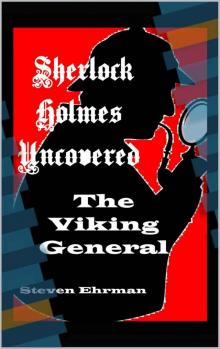 The Viking General (A Sherlock Holmes Uncovered Tale Book 9)
The Viking General (A Sherlock Holmes Uncovered Tale Book 9)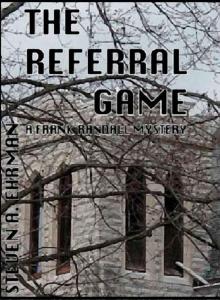 The Referral Game (A Frank Randall Mystery)
The Referral Game (A Frank Randall Mystery) Collection of Four Short Stories
Collection of Four Short Stories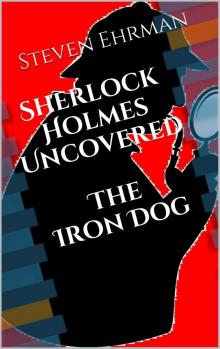 The Iron Dog (A Sherlock Holmes Uncovered Tale)
The Iron Dog (A Sherlock Holmes Uncovered Tale)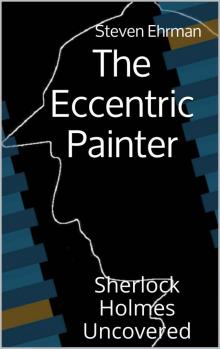 The Eccentric Painter (A Sherlock Holmes Uncovered Tale)
The Eccentric Painter (A Sherlock Holmes Uncovered Tale)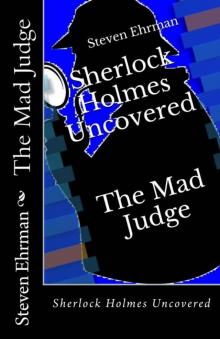 The Mad Judge (A Sherlock Holmes Uncovered Tale Book 3)
The Mad Judge (A Sherlock Holmes Uncovered Tale Book 3)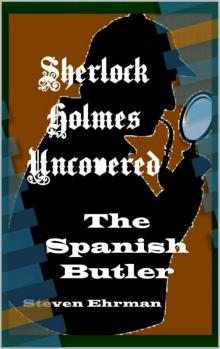 The Spanish Butler (A Sherlock Holmes Uncovered Tale Book 8)
The Spanish Butler (A Sherlock Holmes Uncovered Tale Book 8)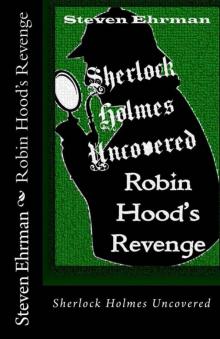 Robin Hood's Revenge (A Sherlock Holmes Uncovered Tale Book 7)
Robin Hood's Revenge (A Sherlock Holmes Uncovered Tale Book 7)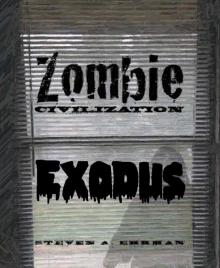 Zombie Civilization: Exodus (Zombie Civilization Saga Book 2)
Zombie Civilization: Exodus (Zombie Civilization Saga Book 2)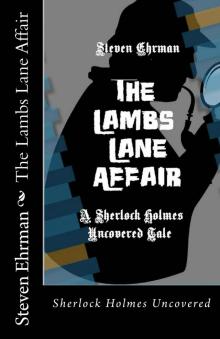 The Lambs Lane Affair (A Sherlock Holmes Uncovered Tale Book 5)
The Lambs Lane Affair (A Sherlock Holmes Uncovered Tale Book 5)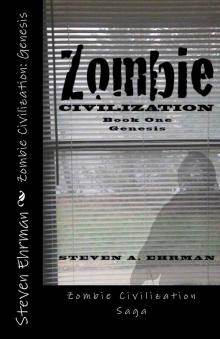 Zombie Civilization: Genesis (Zombie Civilization Saga)
Zombie Civilization: Genesis (Zombie Civilization Saga)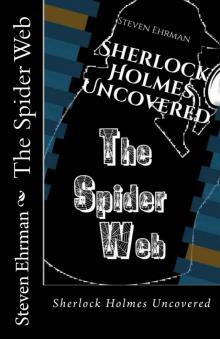 The Spider Web (A Sherlock Holmes Uncovered Tale Book 4)
The Spider Web (A Sherlock Holmes Uncovered Tale Book 4)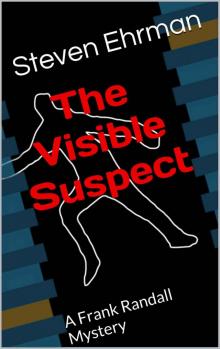 The Visible Suspect (A Frank Randall Mystery)
The Visible Suspect (A Frank Randall Mystery)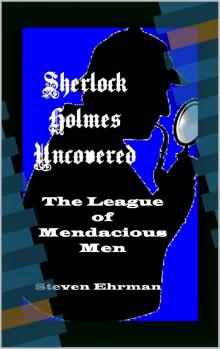 The League of Mendacious Men (A Sherlock Holmes Uncovered Tale Book 10)
The League of Mendacious Men (A Sherlock Holmes Uncovered Tale Book 10)